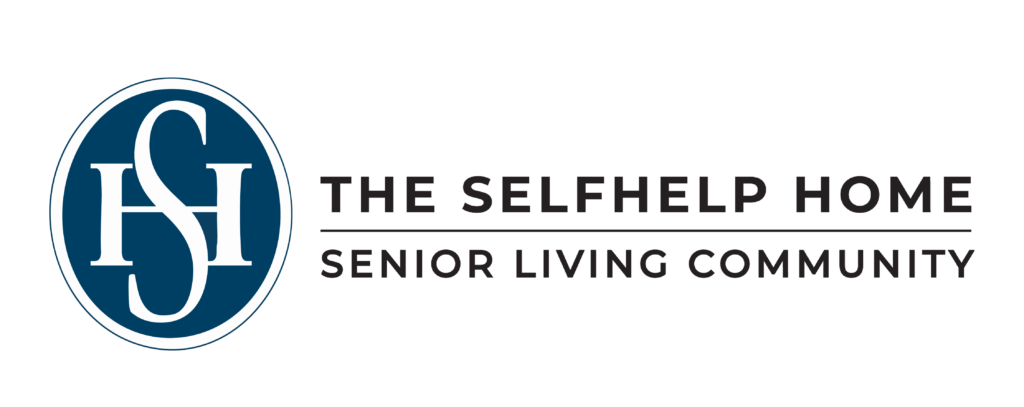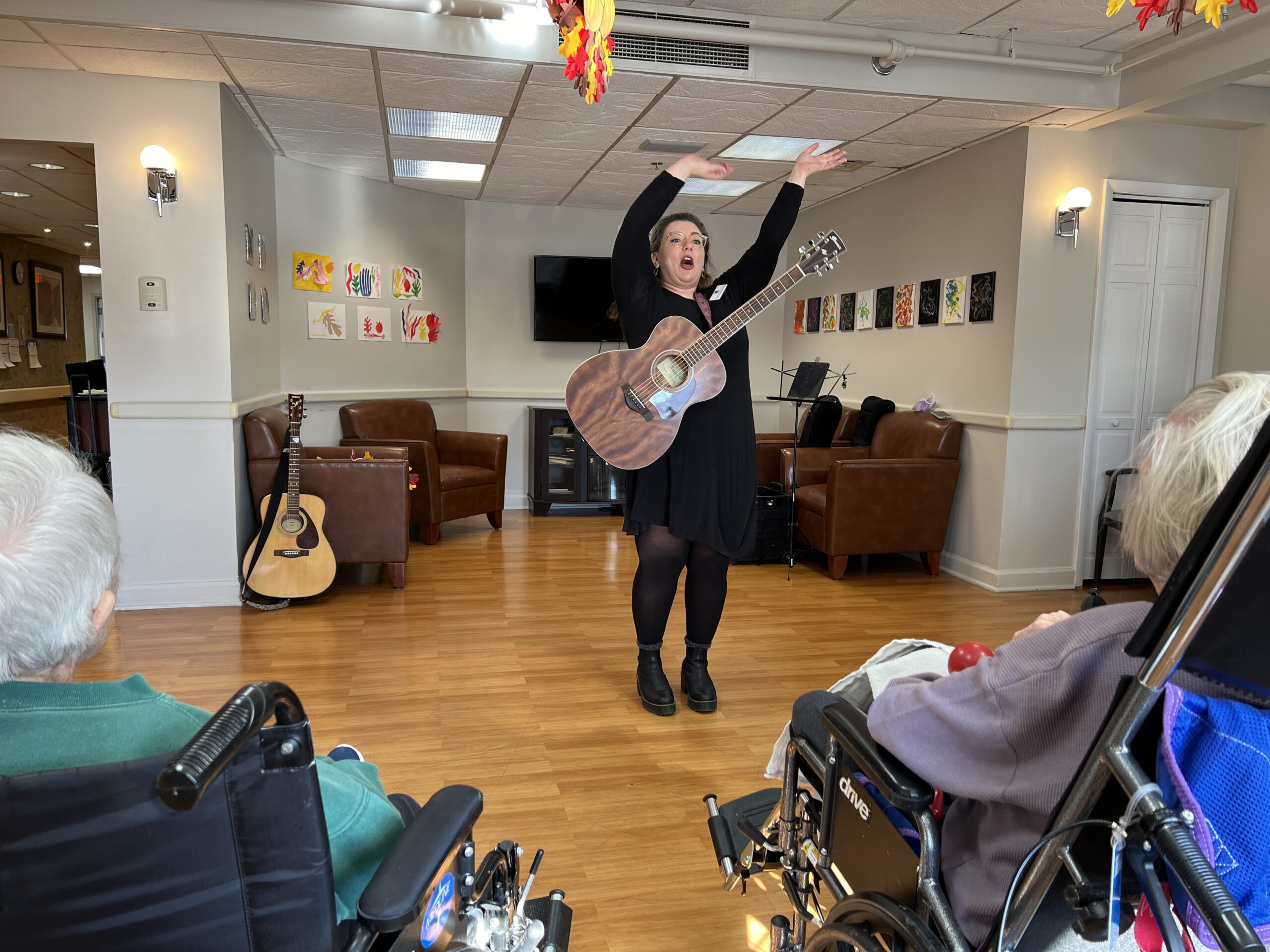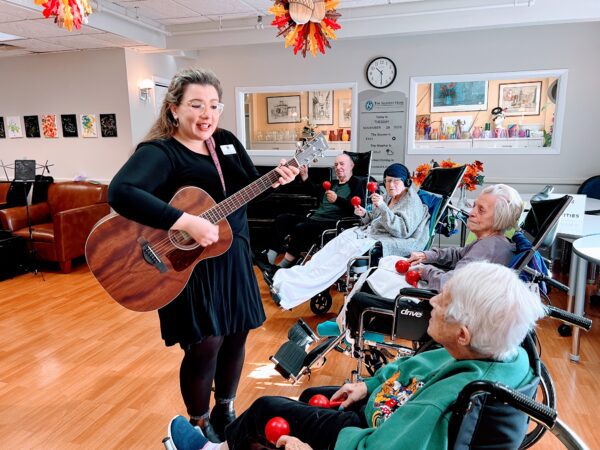The Selfhelp Home is proud to offer a new “Music & Movement” class to our Short-Term Rehabilitation patients on the 6th floor.
The Selfhelp Home has added music therapy to our rehabilitation regimen on our sixth floor. Music therapy is being integrated with physical and occupational therapy in order to provide additional inspiration and incentive for our rehab patients to get moving! This unique, comprehensive program is available at no additional cost.
Physical exercise, especially ambulation, is critical to recovery from injury and illness. Our physical, occupational, and music therapists work together to tailor our approach to each patient in our Health & Rehabilitation Center. This really sets us apart and is resulting in patients who have a more positive and enjoyable rehab experience, as well as stronger and more lasting results in their healing.
Needs may be related to physical, occupational, or speech therapy, using music therapy interventions to address specific rehab goals. Group and or individual sessions may be offered to rehab patients that qualify. Continue reading to learn more…
How would individual sessions of music therapy help aid in individual outcomes? One on one sessions of music therapy can be customized for patients needs and may help aid areas of building strength, cognitive and emotional needs.
Stabilization and Strength: For example, a neurologic music therapy technique called Rhythmic Auditory Stimulation could be incorporated to work on gait pattern, or Melodic Intonation Therapy could be facilitated to work on speech and communication. In addition, playing various musical instruments in non-traditional ways can assist with endurance and strength training.
Cognitive: Music therapy interventions may also be facilitated during these individual sessions to help foster successful participation in rehabilitation therapy. For example, the music therapist could engage a resident with dementia to vocalize to a piece of music that resident likes in order to engage them while the physical therapist helps them work on weight shifting. Music therapy, additionally, can also target goals related to executive functioning and attention.
Emotional Needs: Sessions may also be focused on psychosocial/emotional needs pertaining to the resident’s current condition. For example, a resident may be having difficulty coping with a new diagnosis or struggling with anxiety around having to adapt to needing increased assistance. In this case, the music therapist would use familiar music as a catalyst for self expression, analyze song lyrics, or engage in a songwriting experience.
How does music therapy in group sessions help aid in individual outcomes? Group sessions are co-lead by an occupational therapist and music therapist, this weekly group provides a unique opportunity for the residents on the short-term rehabilitation unit to work on their personalized physical and occupational therapy goals and focus on their functional motor movement. The music therapist provides live music to help facilitate these movements based on neurologic music therapy protocols and techniques, adapting the music in a manner informed by researched effects of music and neurological and motor functioning to help cue successful movement, increase endurance, strength, and tolerance for therapy.
Group music therapy may also include the residents playing instruments in a non-traditional manner in order to meet their physical and occupational therapy goals. For example, two tambourines could be held in front of a resident’s head and the back of their head in order to mimic the motion required to independently brush hair. Adding music to these rehab therapy exercises adds a motivational factor, shown by research, to yield improved outcomes because the resident is driven to “make the music sound good” by playing in-time with the music and to sustain the motion for a long period of time which builds endurance. In addition, there are elements inherent in the music that the music therapist can use to help optimize gain for the resident.
For example, rhythm and beat patterns in the music can help organize the brain and engage, enhance coordination, as well as facilitate specific elements of movement.
Melody and pitch can be used purposefully and strategically by the music therapist to assist with directional movements. Unlike traditional rehab therapy sessions, the social atmosphere of the group allows for camaraderie and normalization. This type of group support serves to enhance individual outcomes.
The Friedmann-Tuber Program for Cognitive Therapies
In October, 2021, The Selfhelp Home proudly introduced our Comprehensive Music Therapy Program supported by the vision of former board member Craig Tuber and underwritten by a generous grant from The Friedmann Family Foundation. Initially the program was piloted and designed to bring music therapy to residents with dementia, as music has been shown to be highly effective in engaging people with dementia and improving their mood, interactions, and overall mental health. Thanks to an expansion of the grant and the generosity of the donors, the program is being expanded and is offered to every resident that would like to participate. A music background is not required.
The Friedmann-Tuber Program for Cognitive Therapies is quickly becoming one of the crown jewels in The Selfhelp Home’s cognitive and cultural programming. The program is implemented under the supervision of our partners at Greater Chicago Music Therapy. The program offers music therapy tailored to residents with dementia, to patients on our skilled nursing floor, and to our independent and assisted living populations. Music therapy has been shown to be highly effective for people experiencing dementia, as well as in motivating and improving healing in rehab patients, and promoting connection and cognition in all seniors. Infused with Selfhelp’s unique Jewish history, our music therapy program really provides a “tune-up” for our community.



